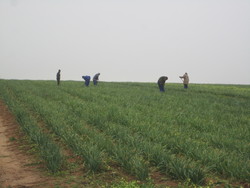
Globally farmland provides returns of between 2% and 4% above inflation. In SA the return is about 8% above inflation, says asset manager Duncan Vink
SA farmland 'outperforms stocks, bonds'
The returns on investments in South African farmland consistently outstrip those of local and international equities, bonds and real estate, says Futuregrowth Asset Management, the venture capital arm of Old Mutual.
Although seen as a "new asset class", investing in farmland "is as old as humankind", says Duncan Vink, head of asset manager the United Farmers Fund, which partners Futuregrowth.Futuregrowth research shows that local farmland has beaten the BEASSA All Bond, the FTSE/JSE all share, the MSCI world equity and IPD real estate indices from 1999 to 2009, measured over three, five and 10 years.
The company has employed the model in three projects since starting the Agri-Fund in December 2010 - a citrus farm in Marble Hall, Limpopo; table grape farms in the Northern Cape; and a deciduous and stone fruit farm in Piketberg, the Western Cape.
Describing South African agriculture as undergoing structural changes towards a more developed and efficient system, which combines high-skilled labour and technology (through mechanisation), Futuregrowth says: "The inclusion of farmland assets in a diversified portfolio will provide long-term horizon investors the stability and higher risk-adjusted return they are looking for."
Target R1bn in R50m tranches
Futuregrowth Agri-Fund manager Smital Rambhai says its investment in farmland on behalf of clients through its Agri-Fund forms part of its social responsibility suite that seeks to make sustainable and responsible investments.
He says socially responsible investment does not compromise returns.
The Agri-Fund has a target size of R1bn and aims for returns of 10% plus inflation. The minimum investment is R50m, mainly from pension and provident funds.
The company's model is based on buying farms with good potential, rather than land that is already optimally developed, and leasing it to well-established operators or farmers who will be able to meet lease payments even in the event of bad weather or other disasters affecting the farm's operations.
"We own the land, the farming implements and infrastructure and the trees and plants. The operator owns the produce and has to pay the lease and the costs, including labour," says Rambhai.
Suitable projects are identified by the United Farmers Fund, which also attends to all agricultural matters outside the operator's area of concern.
Stuff grows
Vink says the buy-and-lease model means that the farmer's biggest capital outlay - land - is circumvented while for investors it is easy to structure, takes less time to monitor and there is no exposure to volatile crop prices.
"You buy and lease to farmers and stuff grows," he says. "Investment in agriculture is nowadays seen as a new asset class but it as a mainstream investment that is as old as humankind. With the world population increasing all the time prospects are good. Food prices are rising and as long as people eat, productive farmland will have value," Vink says.
He adds that globally farmland provides returns of between 2% and 4% above inflation. In SA the return is about 8% above inflation. He says the overall profitability of a farm investment is made up of the total of the farming activity and property businesses.
"Investing in farming has two different possibilities - investing in the property or in the farming. Historically, the property entity has outperformed the farming business," he says.
Rambhai says the farmers typically pay about 8.5% of the land value yearly to lease it, with a built-in escalation for inflation. The lease income goes to clients, with Futuregrowth's investment fees deducted from that.
Social spin-offs
The social spin-offs of the investments include job creation, provision of basic healthcare and education for workers, improving their housing and personal development, such as identifying employees for management training.
At the Marble Hall citrus farm, for example, 300 jobs have been created and on-farm housing has been built for permanent workers.
The general manager of Standard Bank's primary sector agribusiness MC Loock says from a farmer's point of view the term of a contract would be most important when considering whether to lease.
"As land values escalate, a longer-lease term would be more palatable for a lessee. If it is too short the farmers won't get the benefit and also might not use the land responsibly and reinvest in it," Loock says.
He believes farmers leasing land under the Futuregrowth model would be free from the risks of land claims. "Younger farmers often look to lease land rather than buy, much like a young couple renting a home rather than buying, as a means of leveraging their balance sheets. But as soon as they can they want to get into the property market rather than pay off someone else's bond," Loock said.
Source: Financial Mail via I-Net Bridge












